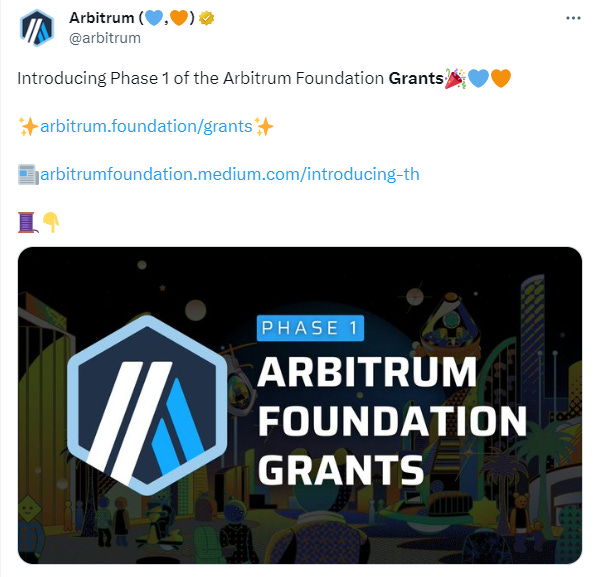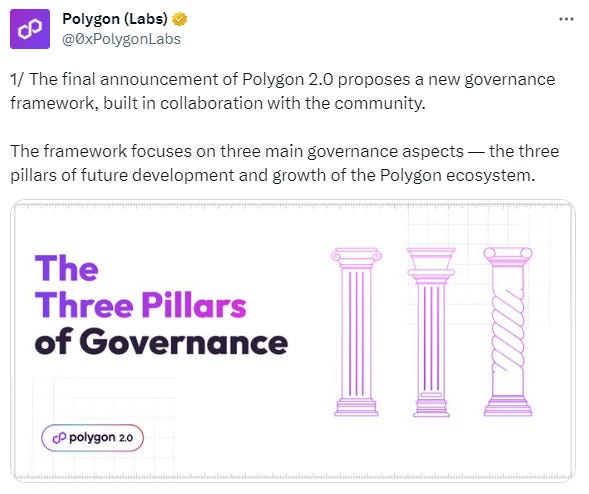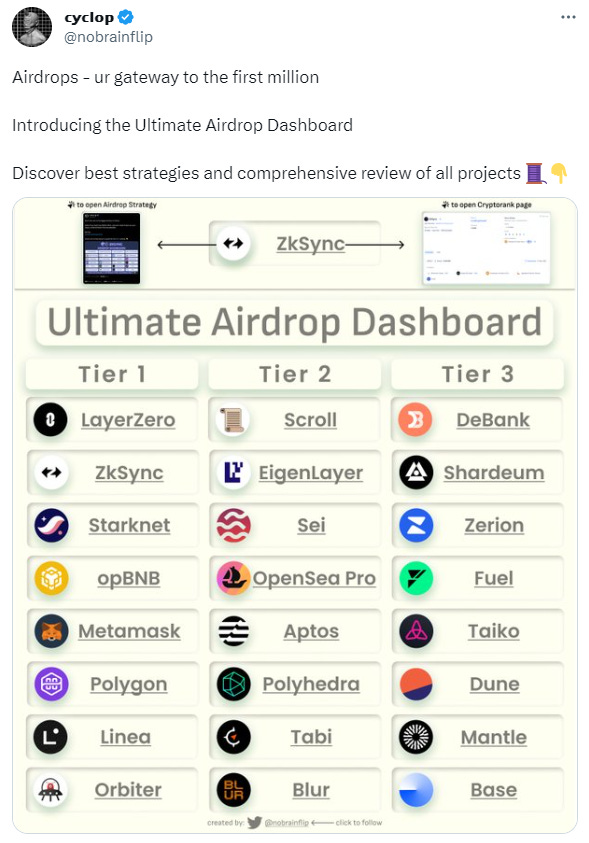Optimism Synthesizes a New Economic Paradigm | Layer 2 Review
Quick Reads and Hot Links Covering the People and Projects Who Are Scaling Ethereum
Dear Frens,
The Layer 2 ecosystem is so busy right now that it’s challenging even for us to keep up! Total Value Locked crashed through the $10 billion ceiling, and zkSync had a breakthrough day earlier this week:

Ethereum’s scaling solutions are rapidly growing, and governance is beginning to take top priority. July saw the introduction of Polygon’s Three Pillars of Governance and Optimism dropped the Law of Chains. These are frameworks for thinking about how to grow and scale ecosystems, and their development will provide valuable insights into how to best build an interoperable onchain world.
As we move toward the future we hope to create, such frameworks will become the history upon which we can reflect, and we’ll hopefully improve with the benefit of hindsight. In this issue, HiroKennelly looks back at two of the textual works which have profoundly influenced the pursuit of socio-economic progress, and illuminates the Optimistic Vision as a framework which takes the best of both models to create a future where public good and profitability are two sides of the same coin.
Read on for the latest stats, threads, proposals, and tidbits from around Layer 2, and don’t forget to vote in our poll to tell us which Layer 2 you use the most.
Contributors: Warrior, jengajojo, thinkDecade, trewkat, HiroKennelly
This is an official newsletter of BanklessDAO. To unsubscribe, edit your settings.
✅ Action Items
🏃♀️ Catch up with the action on the Polygon Forum re: the Three Pillars of Governance.
🗳️ Vote in our first user poll below!
🔥 Hot News
Arbitrum Foundation Grants Program
The Arbitrum Foundation has announced its Foundation Grants Program, initially focused on decentralized applications, tools and infrastructure that will benefit the Arbitrum ecosystem. Note, this is a Foundation-based initiative, and does not overlap with any grants program administered by ArbitrumDAO.
🏛 Governance
⭐ Featured Proposals
The Three Pillars of Polygon Governance
The three pillars of Polygon 2.0 governance are:
Protocol Governance. Taking inspiration from Ethereum, this pillar provides a framework for Polygon Improvement Proposals and developer-oriented calls, and also emphasizes the importance of the community Forum.
System Smart Contracts Governance. Recognizing that infrastructure security is paramount, Polygon uses security councils made up of ecosystem members and security experts to ensure protocol integrity and upgrade contracts. Over time, Polygon would like to pursue decentralized security solutions, reducing reliance on security councils.
Community Treasury Management. Taking a page from Optimism, Polygon wants to explore how it can help to fund the development of infrastructure that supports decentralization efforts.
The post ends with a call for proposals seeking community feedback on the Three Pillars, so please help Polygon build an ecosystem that supports web3 values! Check out this 🧵 for more info:
💬 Proposals in Discussion
Arbitrum
Optimism
Polygon
Starknet
🗳️ Polling Station
🪂 Airdrop Station
📈 Data
Total Value Locked on L2s Surpasses $10 Billion!

Top Ten Projects by Total Value Locked:

🔭 Project Watch
Arbitrum
Top Projects by TVL in the Last 7 Days

Trending NFT Collections

What Projects Are Users Flocking To?

Optimism
Top Projects by TVL in the Last 7 Days

Trending NFT Collections

zkSync
Top Projects by TVL in the Last 7 Days

zkEVM
Top Projects by TVL in the Last 7 Days

Optimism Synthesizes a New Economic Paradigm
Author: HiroKennelly

“It is not from the benevolence of the butcher, the brewer, or the baker that we expect our dinner, but from their regard to their own interest.”
― Adam Smith, The Wealth of Nations
“The time during which the labourer works, is the time during which the capitalist consumes the labour-power he has purchased of him.”
― Karl Marx, Das Kapital
“impact=profit [is] the principle that positive impact to the collective should be rewarded with profit to the individual.”
It’s not news to us that something is wrong with capitalism, this system that has brought so much material wealth to so many, but has also destroyed traditional ways of life, brought large-scale, potentially irreversible damage to our planet, and has turned most people — many of whom want nothing more than to leave work and reunite with the selves they left at home — into data points on the map of economic conquest.
This was foreseen, but it is not our destiny.
In modern times, there have been two foundational texts upon which much of our social and economic structures have been built: The Wealth of Nations (1776) by Adam Smith and Das Kapital (1867) by Karl Marx.
Although academia continues to spill much ink over their differences, these are both core philosophical texts — rich with social and economic data — that reach back into premodern history to demonstrate why and how the world is as it is and what can be done to further their respective visions of human progress.
Even if you don’t agree with what they wrote, it’s hard to argue that the two are great thinkers struggling with big questions, certain in their seemingly incompatible visions for how to lift up humanity and move the needle of progress forward.
Dicing Up the Dialectic
Smith and Marx offer complex socio-economic theories, and without a framework it’s difficult to know how to move through their work. One of the best ways to analyze competing information is via dialectics, with the basic formula as follows:
Thesis → Antithesis → Synthesis, as explained in this fun graph:

The Wealth of Nations, written nearly 100 years before Das Kapital, sets forth the thesis that society will be better off if individuals pursue their own self interest inside of an unrestricted, competitive marketplace. Marx’s response to witnessing what he saw as the dehumanizing effects of unfettered ‘capitalism’ was to publish his antithesis, Das Kapital, arguing that the economic system promoted by Smith exploited workers, forcing them to disjoin their labor and its fruits, causing alienation from their own worth because their labor is used to enrich others, to maximize profits for the “owners of the means of production”. To resolve this conflict, Marx advocated for a worker-led revolution to overthrow the capitalists and institute a society where all had equal status and wealth, a type of social welfare state.
Fast forward to the present, and even the most ardent Marxist is forced to see that the implementation of his ideas have proven ruinous, even if his intellectual work may have been priceless. And yet, we understand the necessity of marketplaces, of enabling those to pursue their self-interest, but as we exist in this state of hypercapitalism where we labor for the profit of others while spending our leisure time enriching the shareholders of social media platforms, many of us wonder if there is another way to create value, to feel valued.
Two hundred and fifty years after Smith and 150 years after Marx, it’s time for a more Optimistic economic model that combines the best parts of capitalism (competition as determined by a marketplace) and socialism (care and support for our fellow humans) to create a synthesis of the two, an Optimistic Vision, and share it with the world.
The result is the Optimism Collective’s simple equation to build a better world:
impact=profit
Impact=Profit Is a Vision For Our Time
At the core of the Optimistic Vision is the idea that digital technologies will enable us to organize and to coordinate as never before, to leave behind the “inherited economic rulesets built for the physical world” and to reimagine our socio-economic architecture to build a new set of operating procedures for a blockchain-powered digital age.
The Optimism Collective may be glass-half-full by nature, but they are also pragmatists, and recognize that marketplace dynamics predate capitalism and are as embedded into our social fabric as long-term relationships. Their response to this tension is to create a regenerative cryptoeconomic model that uses protocol profits to sustain a retroactive public goods funding model built to reward those who make the greatest impact on citizens of the Optimism Collective.
The core idea of impact=profit is that we don’t have to choose between people or profits — digital democratic governance and recursive retroactive public goods funding models mean that we can have our block of cake and eat it too.
And that’s just to start, as Optimism’s ambitions hardly stop where digital borders end:
“We imagine a future in which the Collective expands beyond the digital realm and into the physical world. The idea that a decentralized ecosystem could reliably provide for basic human needs at scale may seem idealistic today, but it will seem commonplace tomorrow. We start small out of a sense of pragmatism, but we aim big out of an overwhelming sense of Optimism.”
Optimism may not have set out to resolve a profound tension 250 years in the making, but they might just end up doing it anyway. Even though we’re witnessing the foundation for a liberating economic revolution, you can be forgiven that it looks mundane. But as with the blockchain, the magic of this revolution is that you don’t need to understand the specifics of how it works to understand the universality of its application.
Just as the internet set information free, the blockchain will set you free.
🔥 L2 Fees and Costs Update
Transaction Fees as of July 25, 2023:

Security Costs as of July 25, 2023:

🗞️ Ecosystem Updates
⛓️ Coinbase Blog: Examining Layer 2 Activity using Onchain Data
🆕 Green Pill Podcast: PublicGoods.Network L2 w Kyle Weiss & Nicole d’Avis
🔀 L2 Deep Dive Thread by Moomsxxx and 0xFinish
➿ Marek Olszewski on the Proposal to Transition Celo to an Ethereum Layer 2
⚡ What is Taiko? An Ethereum-Equivalent and Decentralized ZKEVM L2
🔮 L2BEAT Research Report: Upgradeability of Ethereum L2s
🎁 Pira Finance x BaseNS Partnership Giveaway
🏁 Mantle Network Mainnet Alpha: Launch Highlights








